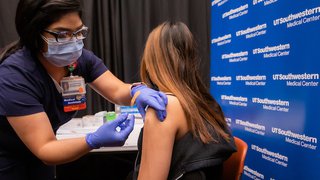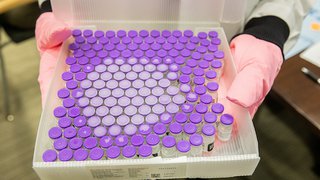Top 10 questions about COVID-19 vaccines for children ages 5-11
November 12, 2021

The U.S. marked a key milestone in the battle against COVID-19 in late October when the Food and Drug Administration (FDA) authorized the Pfizer-BioNTech vaccine for children ages 5-11. The Centers for Disease Control and Prevention (CDC) and American Academy of Pediatrics (ACOG) followed with resounding recommendations that all children ages 5 and older should get vaccinated.
For the parents of our country’s 28 million elementary school kids, this long-awaited development should be cause for celebration. It means their children now have easy access to a safe and highly protective vaccine that will also help protect their friends, family, and community from the spread of SARS-CoV-2.
But we understand parents may still have some questions, so we’re eager to provide you with science-based answers to some of the most common questions about the COVID-19 vaccine for children.
1. Why vaccinate young children if their risk of serious illness from COVID-19 is low?
Since the pandemic began, there have been nearly 2 million cases of COVID-19 in children ages 5-11 in the U.S. – 8,300 were hospitalized and 94 died, according to the CDC. Thankfully, COVID-19 infections are typically mild or asymptomatic in young children, but since the rise of the Delta variant we have seen a significant increase in COVID‑19 hospitalizations among children and teens.
Children with even mild COVID‑19 symptoms may be at risk for long-term side effects, including multisystem inflammatory syndrome in children (MIS-C). As of mid-October 2021, more than 5,000 children have been diagnosed with MIS-C following a COVID‑19 infection.
The best way to keep your child safe – and protect others – is to get vaccinated.
Vaccination for 5-11-year-olds is also key to protecting more vulnerable relatives or caregivers in your household because several recent studies have shown that young children – both symptomatic and asymptomatic – have a greater risk of transmitting SARS-CoV-2. By immunizing children, we can help get this pandemic under control and kids can return to normal activities.
2. How do I know the vaccine is safe and won’t have long-term effects?
A wealth of real-world and clinical data have proven the vaccine is safe. In clinical trials, which met the same FDA standards for safety and effectiveness that all authorized medications do, 3,100 children who received the pediatric Pfizer vaccine were evaluated and no serious safety concerns were identified. Historically, any potential vaccine side effects will likely occur within six weeks of vaccination; children in the clinical trials were followed for two months.
The COVID‑19 vaccines have also been given to millions of people ages 12 and older with very few serious side effects. It’s normal for parents to worry about unknowns for their children, but here’s what we do know: The risks associated with COVID‑19 illness are much greater than any risk from the vaccine.
3. How effective is the vaccine in kids?
Clinical trials showed the Pfizer vaccine to be 90.7% effective at preventing COVID-19 illness in children ages 5-11 two weeks after they received their second dose, though many children will begin to build up some immunity after their first dose.
Also, 99.2% of children in the trials produced antibodies, which is the key to fighting COVID-19 infection. The efficacy data are comparable to the immune response produced in young adults ages 16-25.
4. Will children ages 5-11 receive the same vaccine as people 12 and older?
Children will receive the same Pfizer mRNA vaccine but the dose will be a third less to account for their developing immune systems. Vaccines are not based on weight and do not need to be sized-up depending on your child’s size.
The 5-11 age group will receive two doses of 10 micrograms, 21 days apart. People ages 12 and older receive two doses of 30 micrograms, 21 days apart. The lower dose of vaccine used in children 5-11 induced the same antibody levels as the full dose did in older children and adults. This is likely because the immune system in children is much more responsive to vaccines as compared to adults (this is true for other vaccines as well).
An added bonus for kids 5-11: The needles for their shots are smaller because there is less fluid in the dose.
5. What side effects will children experience?
Some children have no vaccine side effects, and the lower dose could help in that regard. If they do have side effects, the most common include pain or swelling at the injection site, headache, chills, nausea, fatigue, fever, and muscle pain.
Side effects in children are more common after the second dose, but they are short-lived (a day or two) and considered a normal sign that the vaccine is building protection against COVID-19.
Where to get COVID-19 vaccinations for kids
Vaccines for children ages 5-11 are free and available at many pediatrician’s office, community vaccination sites, and most retail pharmacies. Visit vaccines.gov to find a COVID‑19 vaccination site near you. Children's Health patients who are eligible to get vaccinated may receive the COVID-19 vaccine when they come in for their regularly scheduled appointments.
6. What about the risk of myocarditis in kids?
Inflammation of the heart muscle, or myocarditis, is a very rare side effect of the adult vaccine – a recent study found 2.13 myocarditis cases per 100,000 people, or about 0.002%. It has been recorded mostly in adolescents and young adult males ages 16-30.
There were no instances of myocarditis recorded during the pediatric clinical trials for ages 5-11.
The CDC continues to monitor for vaccine-related myocarditis, which is more likely to occur following the second dose. In a vast majority of cases, this rare side effect was short-lived and resolved spontaneously without any medical intervention
Ultimately, people are much more likely to experience myocarditis after having COVID‑19 than they are following vaccination.
7. Does the vaccine affect fertility in any way?
No. That’s a widely circulated piece of misinformation that has been disproven. More than 7 billion doses of the COVID-19 vaccines have been administered worldwide, and there are no recorded cases of the vaccine affecting fertility in women or men. In fact, thousands of women have become pregnant and delivered healthy babies after being vaccinated against COVID-19.
Further, the CDC is now recommending pregnant women get vaccinated, based on data that show that as of late September 2021, there have been more than 125,000 laboratory-confirmed cases of COVID-19 in pregnant people, including more than 22,000 hospitalizations and 161 deaths.
8. Does my child need to be vaccinated if they’ve already had COVID-19?
Data show that the vaccine triggers a stronger immune response than natural immunity. That’s why the CDC and ACOG recommend vaccination for children who have been infected with COVID‑19 to boost their immune response and provide longer-lasting protections.
Several studies have also shown the risk for reinfection is much greater in those individuals who have had COVID-19 and have not been immunized compared to those who have had COVID-19 and have been immunized.
9. Can my child get the COVID vaccine at the same time as other vaccines?
Yes. The CDC determined that it is safe to receive the COVID-19 vaccine at the same time as other routine vaccines, such as flu. Children can get a COVID‑19 vaccine at their pediatrician's office or at community clinics and retail pharmacies. Children’s Health will offer COVID‑19 vaccines to existing patients at its clinics and hospital locations. The COVID-19 vaccine is free regardless of insurance or immigration status.
10. With COVID-19 cases declining, why vaccinate my child now?
COVID-19 case numbers are falling primarily because of the country’s vaccination efforts. As of Nov. 7, 2021, 58% of Americans (193 million) were fully vaccinated and 68% (224 million) had at least one shot. The majority of children and adults hospitalized for COVID-19 have been unvaccinated.
It’s important to remember that we are not out of the woods yet. Just six months ago, in May 2021, it appeared the pandemic was waning, and then the Delta variant became the dominant strain of the virus in the U.S. and cases spiked again. We don’t want a repeat of that scenario. Until the majority of the public is vaccinated, the SARS-CoV-2 virus will continue to circulate and mutate, and if a variant emerges that is resistant to the immunity induced by the vaccines, we are back to square one.
That’s why I can’t emphasize this enough: Get your kids vaccinated if they’re eligible and take advantage of the most effective tool we have to defeat this virus.
Pediatric vaccination facts
Dr. Jeffrey Kahn, Chief of UT Southwestern's Division of Pediatric Infectious Diseases, and his colleagues at Children's Health clear up a common misconception about the COVID-19 vaccine.












